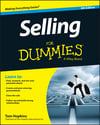11 WAYS TO MASTER THE ART OF SELLING
Here, you have eleven choice bits of selling wisdom to return to as your career progresses. Use this list as your road map to mastering the art of selling, as your eleven easy steps to becoming a champion in all your future selling endeavors.
DEVELOP YOUR CURIOSITY
Before you enter into any new sales experience, make sure you bring with you an attitude of positive anticipation and enthusiasm. Anticipate learning something new — whether it’s about your potential client or about the product itself. Be enthusiastic about learning experiences in your daily life, and keep your mind open as to what experiences might apply in future selling situations.
If you want to be a master of persuasion and selling, keep in mind that all masters were first excellent students. By analyzing your optimum learning patterns and working with them, your attitude about the material being studied will be positive. You’ll be more relaxed and definitely learn at a faster pace.
HAVE REALISTIC EXPECTATIONS
Have realistic expectations for yourself. Practice, drill, and rehearse the strategies until they become a natural part of your speech. Continue to study sales and test new tactics all the time. Allow yourself time to adapt material to your own style in order to create a genuine presentation and communicate naturally with the customer.
Be patient with yourself. Don’t expect to be a winner 100 percent of the time. On the other hand, be honest with yourself and recognize times when inadequate knowledge or an inaccurate application of new selling techniques kept you from giving your best performance.
Know your limitations, but don’t be bound by them. Do what you know you should do, do it the best way you know how, and always stay on the lookout for ways to improve your selling skills.
KEEP AN OPEN MIND AND WELCOME CHANGE
You are changing the way you think about and possibly the way you behave in selling situations just by reading this. Wanting to return to your cocoon when things get tough is only natural, especially if you experienced a degree of success through your old methods. Nobody ever said that change would be easy. Most of the time, changing your old selling habits is harder than trying new ones.
One thing you can do to better accommodate change is to select just a couple of things to change at first. No matter how many things you need to work on, you’ll be too distracted and fragmented if you try to change everything at once. For best results, choose two things to change that would significantly increase your sales. Work on those aspects of your performance until they become normal parts of your routine. When that happens, choose two more new selling skills to learn or change.
REHEARSE, PERFORM, AND CRITIQUE YOUR NEW SKILLS
After you internalize some of your new selling techniques, you need to practice them. At first, go over them by yourself until you feel confident enough to practice them in front of your loved ones or peers who can give you valuable feedback.
When you get advice from people you respect, listen! On the other hand, if you get unsolicited advice from people you don’t respect, don’t let them share in your learning experience: Their responses may damage your delicate psyche.
When you’ve rehearsed so much that the words are permanently etched on your brain, it’s time for your opening night performance. Performing new selling skills and concepts in front of strangers who may recognize your twitching eye and sweaty palms as lack of polish is scary. Give yourself permission to be a rookie, but be sure to follow the rookie rules:
-
Give yourself many, many opportunities to perfect your new selling techniques.
-
When you look back, feed the positive — celebrate all the things you did right.
-
Hold on to your rookie enthusiasm even when you become a polished sales professional.
Honestly critique your performance of your new skills. At this point, you need to look with a critical but fair eye. You’ll be able to do this only after you have performed your new skills for at least three weeks and are able to see measurable increases in your sales.
PERSONALIZE YOUR NEW SALES SKILLS
When you memorize concepts and specific words — and sometimes you must memorize word for word — look for ways to make the words you memorize reflect your personality. Practice how you will say them. Think about how you will carry yourself, how you will stand or sit when you utter those words. Use your sense of humor, your previous knowledge, and your natural speech and mannerisms to make your new selling skills sound spontaneous.
The worst thing you can do is memorize phrases and then shut off your personality and resort to a robot imitation whenever you get desperate. The thing to remember as you sell is to be genuine and personable. Being yourself is almost impossible to do if you haven’t made the concepts you’ve learned uniquely yours by wrapping them in your own words and actions. The last thing you want your clients to feel is that they’re being given a canned presentation.
BE DISCIPLINED
If you crave the financial and personal freedom that a successful sales career can provide, you have to be willing to go the extra mile. If that means working on a Friday night when all your friends are at happy hour, then so be it. If that means getting up hours earlier each morning until you master your new skills, then that’s what you must do. If that means no more two‐hour lunches or lazy afternoons for a while, then make the sacrifice. The sacrifice you make today will pale in comparison to the reward you’ll enjoy later.
Be a self‐disciplined self‐starter, and eventually you’ll reap rewards. One of the greatest pitfalls of great success in a short period of time is a failure to continue to hustle. People have a tendency to want to rest on their laurels when they have had a good run. Slowing down after achieving success quickly is a dangerous mistake. The fact that you’ve tasted some success doesn’t mean that you can stop hustling and fall back into the same old methods that crippled your sales career.
EVALUATE YOUR RESULTS
Accurately evaluating the results you’re getting with your newfound selling skills is difficult if you don’t know what your sales results were before you changed. Sure, you’ll have a hunch about how things are going, but often you can’t trust these feelings.
When you evaluate the results of your efforts, avoid comparing your progress to someone else’s. Even if another salesperson has received the same training and has read the same books as you, everyone learns at different speeds.
KEEP A SUCCESS JOURNAL
Keep a success journal to monitor your performance. By recording specific instances and details of when you successfully used new selling techniques, you not only immediately reinforce the benefits to your career, but more important, when you need encouragement you can review your journal and relive a positive selling experience. Do it. You’ll be surprised at what a great motivational tool a success journal can be. (You can find apps for everything, including success journals, so keep an electronic journal if you like.)
When you review your success journal, compare what you did right in a given situation to what you did when you did not get the sale. When you make such a comparison, the reasons for not getting the more recent sale should become obvious to you. By comparing an unsuccessful experience to a successful one, you see what you left out or skimmed over and why you failed to convince the client of the benefits of your offering.
LEARN FROM EVERY SELLING SITUATION AROUND YOU
You’ll be surprised at how many unexpected selling situations you notice when you keep your eyes and ears open. You’ll soon see in almost every situation where two people come together an opportunity for someone to sell something. Not only will you be alert to the selling situation, but you’ll also start to critique the selling skills used in situations that surround you on a daily basis.
When you witness a good job of selling, make a note of it in your success journal. When a master sells you on something, jot down in your journal the superior job he did in selling you his offering. Make specific notes of things he did that especially impressed or influenced you.
MAKE A COMMITMENT TO LIFELONG LEARNING
Think of every technique you read about as one link in the chain of your success in sales. If you have weak links in your chain, then you may need to review a chapter or two to build, say, your prospecting or presentation skills. If you don’t go back and make the weak link stronger, your career chain will never carry the weight it needs to carry in order to haul you up to top‐producer status. So, stay committed to the education you aspired to gain when you first opened the pages of this book.
If you don’t already know it, you’ll relearn one big lesson every time you teach: When you teach, you learn. By teaching your techniques to others, you clarify your own skills and reinforce your knowledge of what makes an effective salesperson.
PUT YOUR CLIENTS FIRST
This business of getting what you want cannot be a totally selfish act. Your selling success increases at a significantly faster pace when your intention to serve your clients and satisfy their needs is number one on your list. Even though you want to make more profit and more sales, you’re most apt to accomplish these goals only when you put your customers first.
When your clients know that you’re not concerned with being the star, but that you are putting their needs before your own, they forgive some awkwardness or lack of product knowledge. When they can recognize your integrity and honesty, most clients are happy to go the extra mile with you to make your meetings mutually beneficial. People are the key to your sales success.


